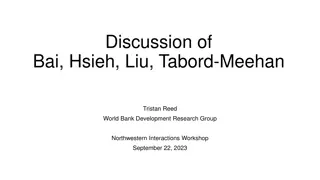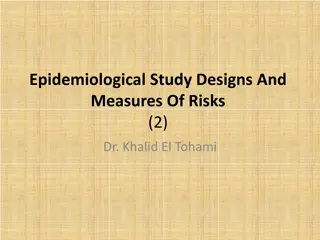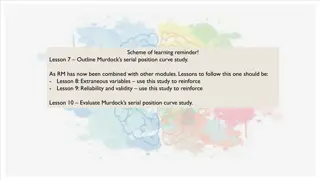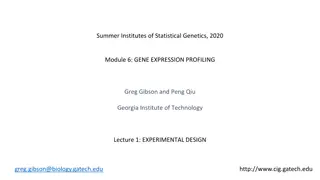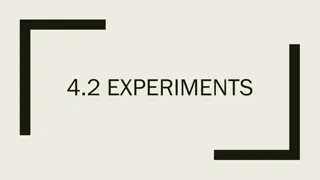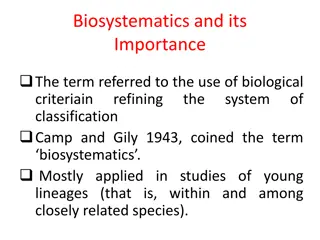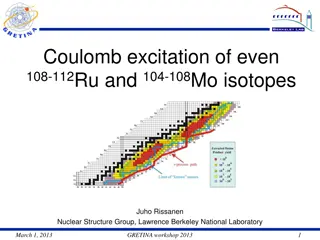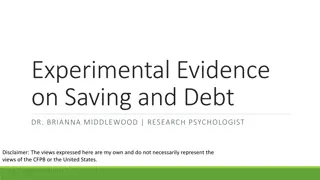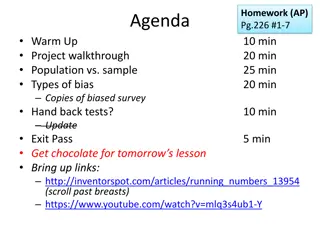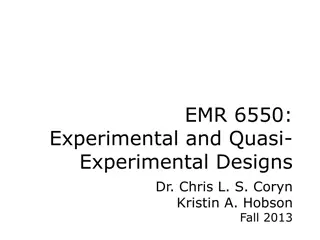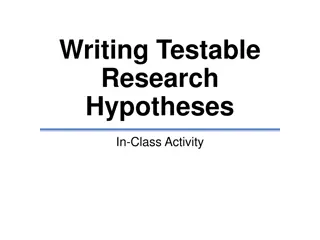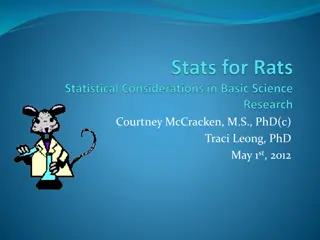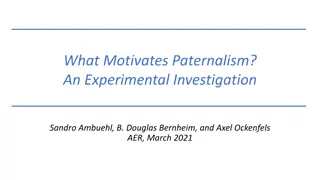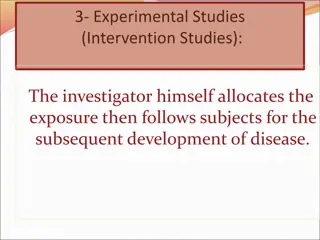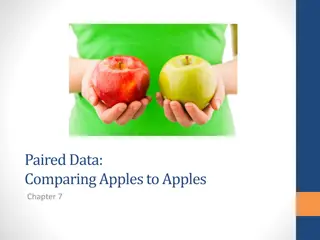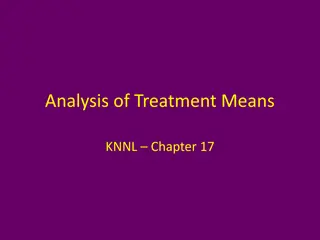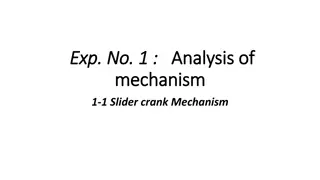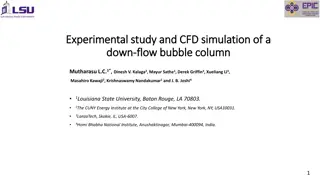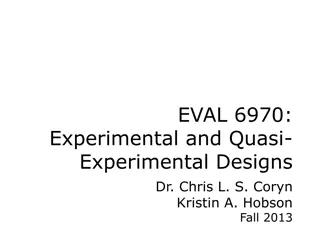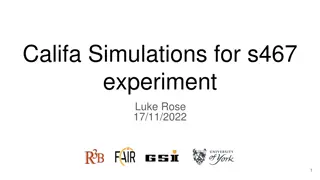Botanical Survey of India and Andaman & Nicobar Islands Conservation Projects
The Botanical Survey of India, Andaman & Nicobar Regional Centre in Port Blair has been actively involved in conservation efforts, including assessment studies and mapping of endemic trees. They have documented various species, collected germplasm, and established experimental gardens. Additionally,
0 views • 55 slides
Introduction to Experimental Economics by John Hey: A Comprehensive Overview
Explore the interconnected realms of Experimental Economics and Behavioral Economics through the insightful lectures of John Hey, an Emeritus Professor at the University of York. Discover the methodology of testing economic theories for validity and the practical applications of experimental economi
1 views • 58 slides
Insights on Experimental ASF Vaccines in Pig Studies
The research conducted by Prof. Jishu Shi and his team at Kansas State University delves into the safety and efficacy testing of experimental African Swine Fever (ASF) vaccines using pigs as the model. Various vaccines, including DNA vaccines and live attenuated viruses, were tested against differen
4 views • 13 slides
Discussion of Randomized Experiments and Experimental Design Challenges
Randomized experiments face statistical power challenges due to rare outcomes and high variance. Stratifying randomization can help control for correlated residual variance based on baseline values of outcomes. Implications for applied economists include addressing attrition and treatment effect het
0 views • 6 slides
Understanding Epidemiological Study Designs and Measures of Risks
This informative content covers various epidemiological study designs, including observational and experimental studies, clinical trials, cohort studies, and more. It explains the concept of cohorts, indications for cohort studies, and the design considerations involved. Images are included to illus
6 views • 41 slides
Learning Reminder: Murdock's Serial Position Curve Study and Experimental Practice
Explore the insights of Murdock's serial position curve study and its applications in experimental psychology. Dive into the concepts of alternate and null hypothesis, Sensory Register, and memory experiments. Engage in practical learning through experiment time activities and visual aids like patch
0 views • 76 slides
Gene Expression Profiling in Statistical Genetics Summer Institute 2020
This content provides information on the Summer Institutes of Statistical Genetics module, focusing on gene expression profiling. It includes details on the schedule, experimental design, RNA sequencing workflow, modes of bulk RNA sequencing, and RNASeq software. The content discusses crucial steps
0 views • 11 slides
Understanding Nonexperimental and Quasi-experimental Studies
Nonexperimental and quasi-experimental studies resemble experiments but lack random assignment, making them valuable for group comparisons without establishing causation. This type of research design looks at differences between groups that already exist, focusing on group differences rather than ca
1 views • 35 slides
Understanding Experiments in Research: Observation vs. Experimentation
Observation and experiments are two crucial methods in research. An observational study involves observing and measuring variables without influencing responses, while an experiment deliberately applies treatments to measure responses. Confounding variables can affect the results, and factors like e
0 views • 13 slides
Understanding Experimental Psychology: Designs and Control Issues in Research
This content delves into the basics of experimental research, focusing on different types of experimental designs and control issues. It covers between-group and within-group designs, discussing advantages and disadvantages, as well as methods for controlling for nonequivalence. The importance of ra
0 views • 26 slides
Understanding Clinical Trials: Types and Designs
Clinical trials are essential research studies that evaluate new tests and treatments to improve human health outcomes. They involve various phases, designs, and purposes, such as treatment trials, prevention trials, and observational studies. Different types of clinical trial designs include experi
7 views • 18 slides
Understanding Biosystematics and Its Significance in Biological Classification
Biosystematics plays a crucial role in refining biological classification by focusing on biological criteria to define relationships within closely related species. It helps delineate biotic communities, recognize different biosystematic categories, and understand evolutionary patterns. Through the
0 views • 15 slides
Understanding Probability: Experimental and Theoretical Concepts
Probability is the measure of the likelihood of an event happening, with experimental and theoretical probability being key concepts. Experimental probability involves determining probabilities through experience or experiments, while theoretical probability can be calculated without prior experienc
2 views • 23 slides
Coulomb Excitation Studies of Neutron-Rich Ru and Mo Isotopes
Workshop presentation on using GRETINA, CHICO, and CARIBU for Coulomb excitation studies of even Ru and Mo isotopes, exploring shape evolution through systematic studies and experimental limitations like beam intensity and purity. Analysis includes gamma intensities, level schemes, and nuclear reori
1 views • 11 slides
Quiz Review on Scientific Method and Graphing
Explore a quiz review covering topics related to scientific method, graphing, and experimental design. Understand key concepts such as hypothesis, scientific law, theory, variables, and experimental control through detailed questions and images. Test your knowledge on laboratory safety, inferences,
0 views • 14 slides
Advances in Baryon Spectroscopy and Hadronic Matter Studies
Discussions at the meeting focused on interpreting HADES results for e+e- and meson production in hadronic reactions, with studies involving proton, pion, light, and heavy ion beams. The role of time-like electromagnetic transitions, baryon spectroscopy, and connecting hadronic matter studies were e
0 views • 12 slides
Experimental Evidence on Saving and Debt: Insights into Consumer Behavior
Dr. Brianna Middlewood, a research psychologist, presents experimental findings on motivating consumers to pay down credit card debt by labeling debt as ordinary or exceptional. The research investigates if nudges based on mental accounts and norms influence repayment behaviors, revealing that peopl
0 views • 21 slides
Understanding Quantitative Research Designs in Nursing
Delve into the world of quantitative research in nursing, exploring different research designs and the concept of causality. Learn about experimental, quasi-experimental, and non-experimental designs, as well as the characteristics of experimental design like manipulation, control, and randomization
0 views • 22 slides
Understanding Experimental Design and Bias in Statistics
Explore key concepts in statistics such as observational studies, experiments, bias, and sampling methods. Delve into the difference between observational studies and experiments, understand the impact of bias in research, and learn about sampling techniques like simple random sampling and stratifie
0 views • 22 slides
Quasi-Experimental and Interrupted Time-Series Designs Overview
Explore the various quasi-experimental designs, control groups, pretests, and outcome patterns in research methodologies. Understand the implications of different outcome patterns on causal interpretation and validity threats in experimental studies.
0 views • 31 slides
Crafting Research Hypotheses in Classroom Activity
This in-class activity focuses on understanding the structure of writing testable research hypotheses for both experimental and correlational studies. It involves selecting variables, operational definitions, and applying them in an experimental approach while practicing directional and non-directio
0 views • 15 slides
Understanding Experimental Design in Biology
Explore key concepts in experimental design in biology through clicker questions focusing on hypotheses, variables, control groups, and experimental groups. Learn how scientists test hypotheses and analyze results to draw valid conclusions in biological studies.
0 views • 15 slides
Compilation and Evaluation of Experimental Data for Nuclei in Z=2-28 Region
Completed compilation and evaluation of experimental Pn and half-lives for nuclei in the Z=2-28 region, led by Balraj Singh at McMaster University. The work involved preparing lists of neutron-rich nuclides, identifying potential emitters, analyzing available experimental data for 1n, 2n, 3n, and 4n
0 views • 20 slides
Biostatistics Core Principles in Experimental Design for Research Studies
Gain insights into the core principles of biostatistics for research studies, including experimental design, sample size considerations, and involving a biostatistician. Learn to formulate clear research questions, determine treatment groups, and address potential sources of variability in your stud
0 views • 52 slides
Advances in Positron Annihilation Spectroscopy and Experimental Research at DLNP Science and Technology Council Dubna
Positron annihilation spectroscopy (PAS) is a powerful technique used to study material structure and defects. DLNP Science and Technology Council in Dubna has been focusing on developing experimental techniques with slow monochromatic positron beams, leading to advancements in defect characterizati
0 views • 6 slides
Advances in Ceramic Composite Property Modeling and Experimental Characterization
European research focuses on advanced modeling of C/C, C/SiC, and SiC/SiC composites for aerospace and nuclear applications, with an emphasis on correlating simulations with experimental validation. Laboratories are progressing towards a multiscale approach, integrating micro/nanomechanical characte
0 views • 5 slides
What Motivates Paternalism? An Experimental Investigation
Centuries of normative debate on paternalism have resulted in its ubiquity in various aspects of society, from consumer protection to safety regulations. However, there is a scarcity of empirical studies on the motivations behind paternalistic interventions. This experimental investigation delves in
0 views • 12 slides
Adventist Health Studies Contributions & Collaborations Overview
Adventist Health Studies have made significant contributions to understanding the health and longevity advantages of Seventh-day Adventists, particularly focusing on vegetarian diets and cardiovascular health. With a history spanning over 57 years and various cohort studies, these studies have provi
0 views • 12 slides
Understanding Experimental Studies: Intervention, Characteristics, and Measurements
Experimental studies involve the investigator assigning exposures and following subjects to observe disease development. Different types of experimental studies exist, such as preventive and therapeutic types, each with its limitations, including ethical concerns and challenges in recruiting subject
0 views • 13 slides
Understanding Paired Data Analysis in Research Studies
This content discusses the significance of paired data, its role in reducing variability, and examples of experimental designs used in research studies. Explore comparisons between Meijer and Family Fare prices, and testing The Freshmen 15 theory. Discover how different music types affect studying a
0 views • 55 slides
Understanding Research Methods and Data Analysis
This review covers topics such as experimental classification, the comparison of non-experimental and experimental research, software features like JMP and SPSS, outlier handling in data analysis, and levels of measurement in statistical analysis.
0 views • 13 slides
Statistical Analysis of Treatment Means in Experimental Studies
The content discusses various statistical methods to analyze treatment means in experimental studies, including KNNL models, main effects plots, inference for individual treatment means, comparing two treatment means, and contrasts among treatment means. It covers topics such as parameter estimation
0 views • 25 slides
Vietnam Neutrino School Overview
Vietnam School on Neutrino is an annual event started in 2017 to promote experimental neutrino physics in Vietnam. Led by Prof. Jean Tran Thanh Van, the school focuses on lectures, software and hardware training, group works, and excursions. With a mix of students from various countries, the aim is
0 views • 7 slides
Analysis of Slider-Crank Mechanism and Experimental Data
Slider-crank mechanism analysis involves understanding the transformation of input motion into desired output motion. This mechanism consists of a crank, coupler, slider, and ground link, converting circular motion into linear motion. Experimental procedures involve setting crank angles and recordin
0 views • 6 slides
Experimental Study and CFD Simulation of a Down-flow Bubble Column
This study and simulation focus on the experimental setup, measurement techniques, and results of a down-flow bubble column. It explores novel features such as inverted bubbly flow, micro-bubble generation, and gas injection. Detailed analysis includes axial and radial variations of volumetric gas h
0 views • 25 slides
Understanding Experimental and Quasi-Experimental Designs
Explore the foundations of experimental and quasi-experimental designs, delving into causal relationships, counterfactual reasoning, and the importance of validating statistical and internal conclusions. Learn about causes, effects, and the complexity of determining causation in research. Discover R
0 views • 46 slides
Understanding Probability: Learning Outcomes and Examples
This content delves into the study of probability, covering topics such as representing probabilities of simple and compound events, calculating relative frequencies, multi-step chance experiments, theoretical and experimental probabilities. It explains concepts like chance experiments, sample space
0 views • 31 slides
Understanding Experimental Studies in Epidemiology
Epidemiological studies and experimental studies play vital roles in understanding cause-and-effect relationships in research. Experimental studies involve manipulating independent variables and measuring dependent variables, with categories such as true experimental, quasi-experimental, and pre-exp
0 views • 22 slides
Califa Simulations and Experimental Observations in Nuclear Physics Research
Exploring nuclear physics research through Califa simulations and experimental observations with a focus on PID gating, clustering algorithms, beam settings, and Ca isotopes chain gating. The study involves simulating events on CH2 targets, analyzing clustering effects, and observing opening angles
0 views • 10 slides
FY25 LBS Lab OMEGA/OMEGA EP Proposed Campaign
Proposed campaign in FY25 by the LBS Lab to measure specific deliverables, compare results with experimental and theory PIs, collaborate with others, and assess technical issues such as target fabrication feasibility. The campaign involves motivation, relevant milestones, previous/simulated results,
0 views • 6 slides



